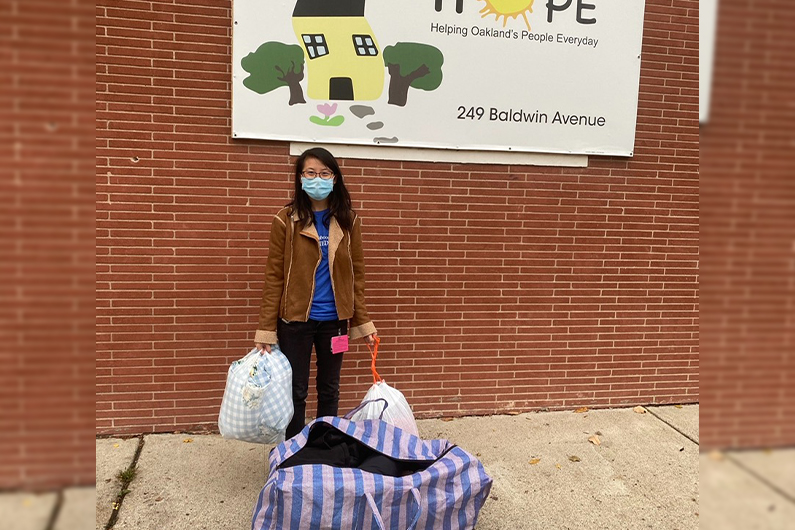
OUWB’s student-led Street Medicine Oakland program recently led a successful winter clothing drive for community members in need.
According to Kaitlin Pataroque, M3, a member of the organization’s leadership team, 236 articles of clothing and 22 blankets/sleeping bags were collected by the group.
Held for the second consecutive year, Pataroque says the drive represents an extension of services provided by Street Medicine Oakland.
“When we go out to the streets, most of the time we’re just trying to build relationships…people don’t always want medical attention,” says Pataroque. “Especially during the winter months, they always ask us if we have any clothes.”
OUWB’s Street Medicine program launched in 2019, and is a first-of-its-kind program in Oakland County. Initially focused on Pontiac, it has since expanded to also provide services in Royal Oak.
 | |
| Pataroque stands with some of the clothes collected. | |
 | |
| Pataroque stands with some of the clothes collected. |
The program has received support from organizations such as the Oakland County Homeless Healthcare Collaboration, Gary Burnstein Community Clinic, and Projects for Assistance in Transition from Homelessness (PATH).
Street Medicine Oakland also received a small grant from Compass, OUWB’s department for community engagement, and a $57,000 grant from the DMC Foundation, which is affiliated with the Community Foundation of Southeast Michigan.
The program already has made a big difference in the community by helping the homeless population in myriad ways — from assisting people struggling with drug and alcohol addiction to helping the vulnerable population manage their respective ways through one of the worst global pandemics in history.
With regard to Michigan’s long, cold winters, Pataroque says Street Medicine team members were worried about the people on the streets suffering weather-related health issues, such as frostbite. However, she adds, the organization could only afford hand warmers and socks.
“Good winter gear was something that we really needed,” she says.
The Street Medicine team turned to a local Buy Nothing group on Facebook for help. Founded in 2013, the Buy Nothing Project aims to build community by connecting people through hyperlocal gifting.
Pataroque says she asked the group members if they had winter clothes they didn’t need, and received a positive response. They also turned to local churches for help.
“We spent a whole day just picking up winter clothes from different locations,” she says. “The amount of clothes we got took up my entire living room…it was really amazing.”
Specifically, the group collected 15 pairs of shoes, 40 coats and sweaters, 30 shirts, 25 pairs of pants, and many other miscellaneous items like socks, hats, gloves, and scarves.
Pataroque says some people who gave items included thank you notes with their donations. The experience left her feeling taken aback by “how kind and generous” people can be when asked to help.
“I just feel so grateful,” says Pataroque. “It’s something that we would not be able to do just by our own efforts. It’s really amazing to see the generosity of the community.”
For more information, contact Andrew Dietderich, marketing writer, OUWB, at adietderich@oakland.edu.
To request an interview, visit the OUWB Communications & Marketing webpage.
NOTICE: Except where otherwise noted, all articles are published under a Creative Commons Attribution 3.0 license. You are free to copy, distribute, adapt, transmit, or make commercial use of this work as long as you attribute Oakland University William Beaumont School of Medicine as the original creator and include a link to this article.

